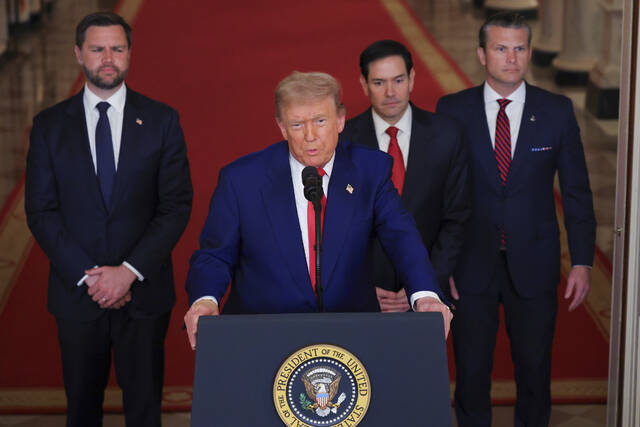https://triblive.com/news/world/deluzio-lee-support-proposal-to-give-congress-control-over-war-powers/
Deluzio, Lee support proposal to give Congress control over military action in Iran

U.S. Rep. Chris Deluzio supports a proposal that would prevent President Donald Trump from ordering the further use of military force in Iran without authorization from Congress.
Deluzio, D-Fox Chapel, and 11 fellow House Democrats — all of them veterans — wrote a letter to the White House indicating their support for a resolution to limit Trump’s war powers. A proposal in the House has more than 50 co-sponsors, including Deluzio and U.S. Rep. Summer Lee, D-Swissvale, while a similar measure has been introduced in the Senate.
“Twenty years ago, in their rush to appear strong and tough, politicians from both parties failed to ask the hard questions before starting wars in Iraq and Afghanistan,” Deluzio and his House colleagues wrote. “Now, trillions of dollars and countless deaths later, we still haven’t gotten accountability. We refuse to make those same mistakes.”
The letter writers described the Iranian regime and its proxies as “evil” and said they are “intent not only on the destruction of Israel, but also the United States.”
But Deluzio and his colleagues said Article I of the U.S. Constitution “explicitly requires a vote by Congress to declare war.”
Although Article I gives Congress the authority to declare war, that has not been formally done in more than 80 years. The recent wars in Iraq and Afghanistan were not formally declared wars, but Congress approved Authorization for Use of Military Force (AUMF) resolutions in those cases.
John B. Bellinger III, an adjunct senior fellow for international and national security law at the Council on Foreign Relations, wrote in a brief last week that Congress’ authority to declare war “has never been interpreted — by either Congress or the executive branch — to require congressional authorization for every military action that the president could initiate.”
Trump’s powers under Article II of the U.S. Constitution include “authority not only to order the use of military force to defend the United States and U.S. persons against actual or anticipated attacks, but also to advance other important national interests,” Bellinger said.
Under the War Powers Resolution of 1973, when military force is used without war being declared, the president has up to 48 hours from the initiation of the military action to notify the speaker of the House and Senate president pro tempore why the action was taken. It also limits the amount of time the military can be engaged without congressional approval to 60 days. That measure was enacted in response to secret bombings of Cambodia during the Vietnam War.
A new War Powers Resolution would “ensure we have a full and honest conversation with the American people about what American military action against Iran would mean. While destroying nuclear sites may achieve initial tactical success, it far from guarantees long-term strategic victory,” Deluzio and his colleagues said in their letter.
Copyright ©2026— Trib Total Media, LLC (TribLIVE.com)
